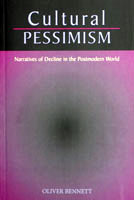Cultural Pessimism and Cultural Optimism
In Cultural Pessimism: Narratives of Decline in the Postmodern World (Edinburgh University Press, 2001), Oliver Bennett examined the growth of pessimism in the last decades of the twentieth century. The book argued that during this period narratives of decline in many fields had produced a pessimism that could justifiably be described as ‘cultural’. These fields included ecology, human rights, military history, international relations, criminology, history of science, cultural criticism and political economy.
Prof Bennett then turned to the subject of optimism. The first results of this research were published in Cultural Sociology, vol 5, no 2, 2011, in an article entitled 'Cultures of Optimism'. Drawing on material from a broad range of fields, this article identifies an ‘optimism of everyday life’ and proposes that it performs significant psychological, social and cultural functions. These functions are reviewed, with particular reference to psychological and physical health, family and social relationships and the achievement of goals in different contexts. The article argued that the necessity of optimism has given rise to a complex of optimism promoters, which function as agents of implicit cultural policy. The family, religious institutions, the medical profession, psychotherapists and counsellors, businesses and political leaders are, amongst others, all seen to be part of this complex, deeply engaged in the reproduction of a culture of optimism. Whilst a multiplicity of values is reflected in individual expressions of optimism, a kind of meta-value is expressed in its common, cognitive form: of energy over entropy, of living over dying.
The second article arising from this research, entitled 'The Manufacture of Hope: Religion, Eschatology and the Culture of Optimism', was published as part of a special issue of the International Journal of Cultural Policy (Vol 17, No 2, 2011), edited by Oliver and Jeremy Ahearne, on the subject of religion and cultural policy. This article focused on the role of religion in the production of optimism, with particular reference to soteriology (theories of salvation) and eschatology. From a ‘detached’ and ‘functionalist’ perspective, it analysed how religions manufacture hope through (1) the production of meaning; (2) through its models of divine justice; and (3) through theories of ultimate destiny. These matters are discussed in relation to Hinduism, Buddhism, Christianity and Islam. The article concluded that the optimisms of religion are of a quite different order from those promoted by other institutions.
This research was the starting point for a more ambitious project, which resulted in a monograph, entitled Cultures of Optimism: The Institutional Promotion of Hope (2015). In the context of widespread intellectual pessimism, the book explores how individuals and societies sustain hope. It focuses, in particular, on the institutional propagation of optimism across several domains: democratic politics; work; the family; religion and psychotherapy. The book addresses a number of questions: what are the functions of optimism in modern societies? How and why do institutions promote it? What values and attitudes are involved? Drawing on a range of disciplines, including social and evolutionary psychology, intellectual history and organisational behaviour, this book throws new light on an important but neglected aspect of modern culture. Prof Bennett was a member of the Science Advisory Board for the research project, 'Hope and Optimism: Conceptual and Empirical Investigations', led by Cornell University and the University of Notre Dame.

